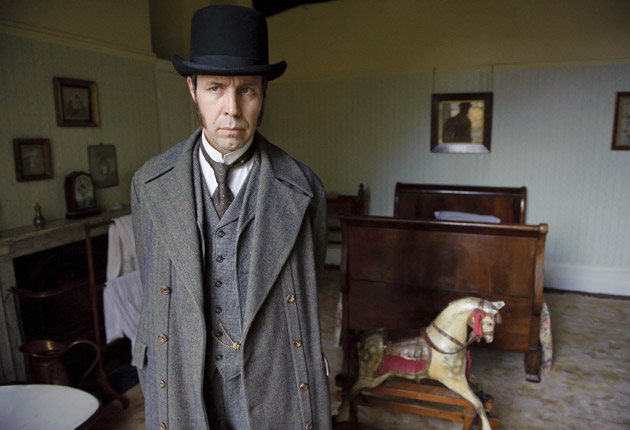The
Suspicions of Mr Whicher, ITV1, Monday
MasterChef, BBC1, Mon, Tues, Wed
What do
you get if you cross 'Downton Abbey' with 'Sherlock Holmes'' A misguided
attempt to recast real-life murder as holiday entertainment
|
 |
|
Elementary: Paddy
Considine in a lavishly decorated but boredom-inducing The
Suspicions of Mr Whicher |
What
better way to bring last week's Bank Holiday weekend to a close than to
settle down in front of a two-hour, one-off costume drama about the
brutal slaughter of a small child' Not that that was how ITV was selling
The Suspicions of Mr Whicher, you understand.
The
dramatisation of the 1860 Road Hill House murder ' in which the
16-year-old Constance Kent confessed to killing her three-year-old
stepbrother, Saville ' was real-life crime sanitised for the Downton
Abbey brigade. Here, the body was pulled from the cesspit underneath the
outside toilet with no visual trace of where it had been hidden. The
fact that the boy's throat had been slit from ear to ear so forcefully
that his head was nearly hanging off was never mentioned.
The case
itself, the original country-house murder mystery and the subject of
Kate Summerscale's award-winning 2008 book, seemed almost secondary. Why
waste time on facts when you can show every conceivable clich'(fiddlers
in the street, chugging steam engines, excessive facial hair) of
Victorian Britain'
In truth
there was nowhere else for this drama to go. Summerscale's book had
woven the case around an extended essay on the early appearances of
canny crime-crackers in fiction. Her musings that "in a newly uncertain
world the Victorian detective offered science, conviction, stories that
could organise chaos" had no place here. Instead we got Paddy Considine
trying to look deep in detective-y thought, a few scraps of dialogue
about the class issues that made the case so riveting at the time, and a
perpetrator, in Alexandra Roach's Constance, desperate to steer her
accent from Wales to Wiltshire.
The whodunnit was dispensed with
in the first 45 minutes. The exposition never let up. The attention to
period detail meant any echoes of the case's modern-day equivalents
(James Bulger,
Madeleine McCann) were so faint as to
be barely audible. So we were left with costume drama as comfort food; Midsomer Murders with mutton chops. The real detective inspector Jack
Whicher inspired Wilkie Collins, Charles Dickens and Arthur Conan Doyle.
The television drama provoked only lavishly decorated boredom.
It was
difficult at times not to feel the same way about this year's MasterChef.
After week after week of watching first the untried (solo, open
auditions; a shiny new set) and then the familiar (contestants cook for
food critics, at a top restaurant, for John Torode and Gregg Wallace
etc), anyone who made it through this mealy marathon would find their
patience worn as thin as filo pastry.
And yet
in spite of this and the flaw at the core of the form (unlike, say, X
Factor or Britain's Got Talent, we at home are unable to judge the
contestants' core skill), I watched every episode. I can only say in my
defence that there is something strangely compelling about watching
other people breaking out in a cold sweat.
Was the
format ruined' Not really. After the uproar that greeted those
unfamiliar early episodes the series seemed to settle into much the same
pattern ' and viewing figures ' it has had since 1990. And though the
eventual winner was apparent from the moment Wallace declared "I still
don't know if he's brilliant or mad", Tim Anderson proved a deserving
and unassuming recipient of the trophy.
While
his two fellow contestants gave it the usual spiel about how much
winning would mean to them, Anderson stated simply that he would be
happy whoever triumphed. And it doesn't take a Jack Whicher to work out
that those are the words of someone who will quietly succeed in the
industry. My suspicion is he'll have his Michelin star within a year |


